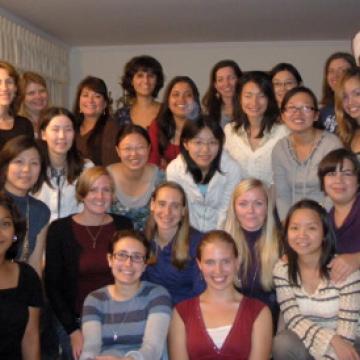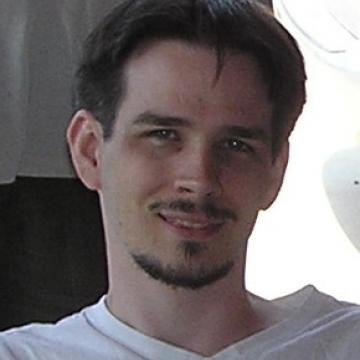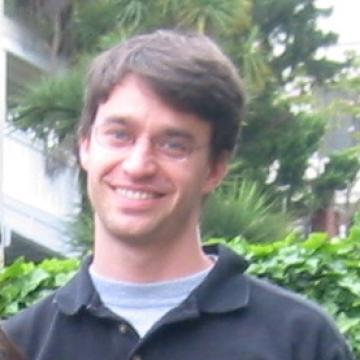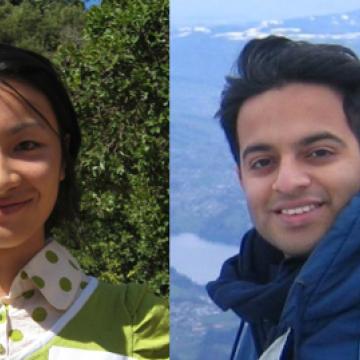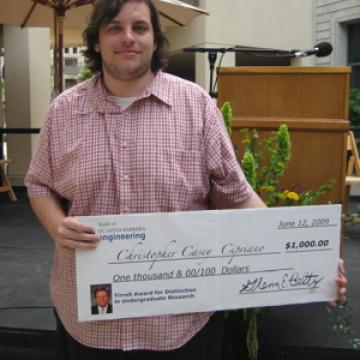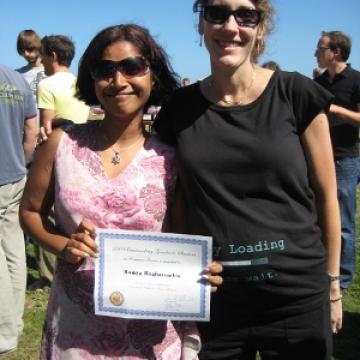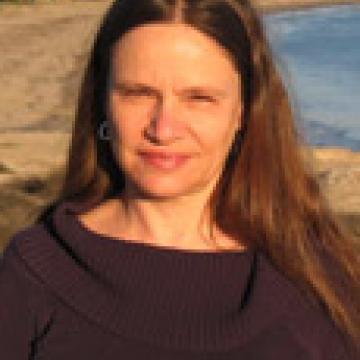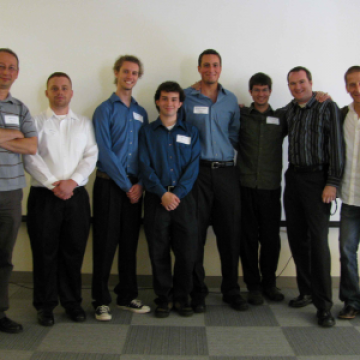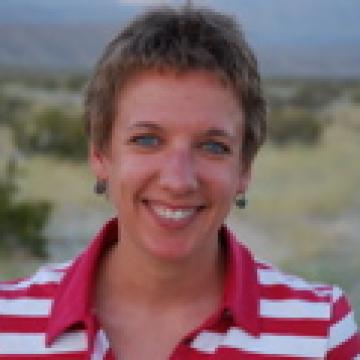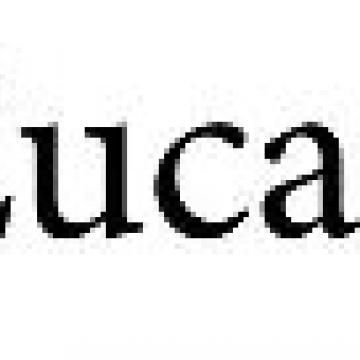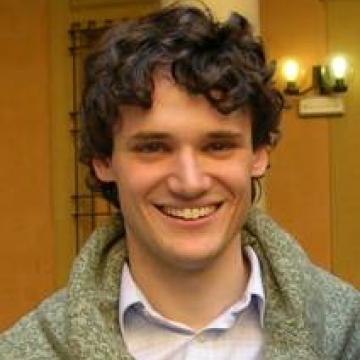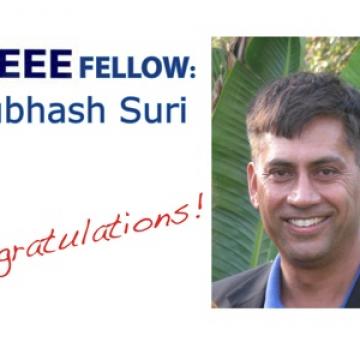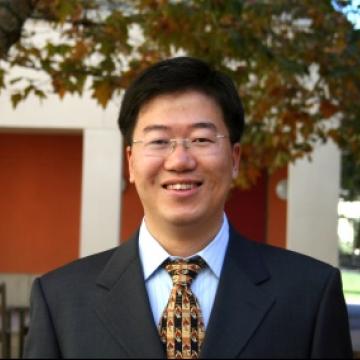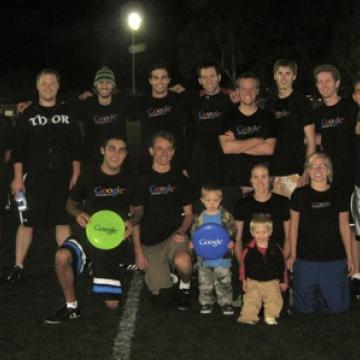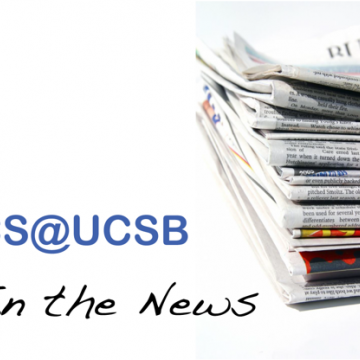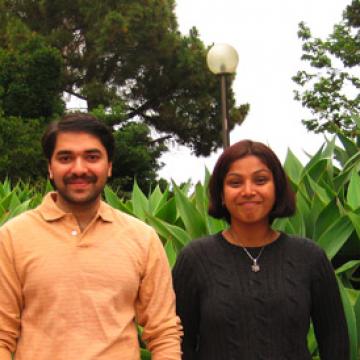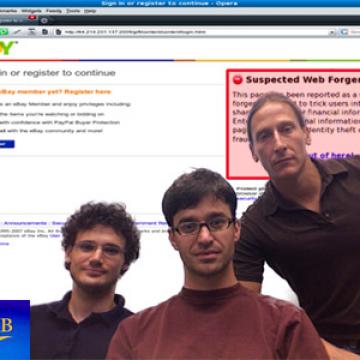News Archive
Each year a committee of industry experts and faculty chooses 10 papers from
the top computer architecture conferences to highlight in the annual “Top
Picks” issue of IEEE Micro. This year UCSB Computer Science students Mohit
Tiwari, Xun Li, Hassan Wassel, Bita Mazloom, and Shashi Mysore along with
their advisors Fred Chong and Tim Sherwood had their work on
Tracking Information Flow at the Gate-Level for Secure Architectures
selected for this prestigious publication.
Prof. Tevfik Bultan and M.S. student Zachary Stengel identified a flaw in a novel operating system developed by Microsoft Research called Singularity. Although Singularity operating system has been developed with the goal of improving dependability, due to this flaw, Singularity processes were vulnerable to deadlocks.
On December 4th, 2009 the largest hacking competition ever carried out was held at UCSB. The competition included 56 teams from North America, South America, Europe, Russia, India, and Australia.
UCSB faculty Matthew Turk, Tobias Höllerer, Chandra Krintz, and Rich Wolski, along with Media Arts and Technology professor JoAnn Kuchera-Morin, have received $1.25M in infrastructure funding from the National Science Foundation to equip the first generation AlloSphere, a large, three-story spherical environment for synthesis, manipulation, exploration and analysis of large-scale data sets, with applications in science, design, art, and entertainment. For more information on the AlloSphere, visit http://www.allosphere.ucsb.edu.
A team of UCSB computer scientists is part of a consortium chosen to establish an Information Networks Academic Research Center (INARC) by the US Army as a part of its Network Science Collaborative Technology Alliance (NS CTA). The information networks multi-campus collaborative effort is led by the University of Illinois, and also includes IBM and City University of New York. The total effort will be funded at about $16.75 million, of which the UCSB team will receive approximately $3.6 million.
Prof. Divyakant Agrawal is serving as Program Chair for SIGMOD 2010, which will be held on June 6-11, 2010 in Indianapolis, USA. The annual ACM SIGMOD conference is the most prestigious international conference for database researchers, practitioners, developers, and users to explore cutting-edge ideas and results, and to exchange techniques, tools, and experiences.
The Summit is composed of a “dream team” of computer security experts gathered to develop “game-changing” national IT strategies for the Obama administration.
A research team lead by Prof. Kevin Almeroth, Christopher Kruegel, and
Giovanni Vigna, at the University of California at Santa Barbara hijacked
the Mebroot botnet for about a month and used it to study drive-by
downloading. Drive-by downloading involves hacking into a legitimate site
to covertly install malicious software on visitors’ machines or redirect
them to another site.
The Department of Computer Science Women in Computer Science (WiCS) group
hosted its third annual Fall potluck in October 2009 to welcome its new
female graduate students. The Department of Computer Science’s graduate
program is currently almost 24% female, well above the national average of
about 20%. Welcome to all of our new students and we encourage you to check
out the WiCS homepage!
Prof. Christopher Kruegel and Prof. Xifeng Yan are the first scholars appointed to
the Eugene Aas Endowed Chair and the Venkatesh Narayanamurti Endowed Chair
in Computer Science. A special inaugural celebration will be held October
22, 2009. Details are available on our Endowed Chairs webpage.
UCSB COMPUTER SCIENCE DEPARTMENT PRESENTS:
WEDNESDAY, OCTOBER 14, 2009
3:30 – 4:30
Computer Science Conference Room, Harold Frank Hall Rm. 1132
HOST: Subhash Suri
SPEAKER: GEORGE VARGHESE
Computer Science, UC San Diego
Title: Getting an Edge at High Speeds: Randomized Algorithms and
Networking Hardware
Abstract:
To deal with the complexities of modern software, computer scientists are
increasingly reliant on special software tools such as data-race detectors,
memory bounds checkers, and data flight recorders. However, these tools can
make the programs being tested run hundreds to thousands of times slower
than normal. In their paper on “Quantifying the Potential for Program
Analysis Peripherals”, UCSB students Mohit Tiwari and Shashidhar Mysore,
along with their advisor Professor Tim Sherwood, show that significant
Dr. Ben Hardekopf joined our department as an assistant professor. He received a B.S.E. in Electrical Engineering and B.S. in Computer Science from Duke University in 1997, a Master’s degree in Computer Science from SUNY at Utica/Rome in 2000 while serving as an active-duty officer in the United States Air Force, and a Ph.D. in Computer Science from the University of Texas at Austin in 2009.
The Department of Computer Science is sponsoring the Fourth Annual Computer
Science Graduate Student Workshop on Computing. The focus of this workshop
is to highlight top student research within the department, promote the
exchange of ideas among students, faculty and industry, and familiarize new
graduate students with the research conducted within our department and the
larger computer science community. Top research papers from graduate
students will be presented as fifteen minute talks. The workshop will also
Christopher Kruegel received the 2008 National Science Foundation Early Career Development (CAREER) award. CAREER awards, given to future academic leaders, are NSF’s most prestigious grants for young scholars. The award provides support for research in the amount of 400K dollars over a five-year period. Prof. Kruegel becomes the 17th NSF CAREER Award winner in our department.
Computer Science Senior Christopher Casey Cipriano wins the Tirrell
Award for Distinction in Undergraduate Research.
Ramya Raghavendra, a graduate student in the Computer Science
Department at UC Santa Barbara, wins 2009 Google Anita Borg Memorial
Scholarship!
The Google Anita Borg Memorial Scholarship is awarded each year to
female computer science students selected on the basis of academic
excellence and leadership. The scholarships, which carry an award of
$10,000, celebrate the life’s work of the late Anita Borg.
The Society for Industrial and Applied Mathematics (SIAM) recently
announced the SIAM Fellows Class of 2009 and the inauguration of the
SIAM Fellows Program. The SIAM fellowship is an honorific designation
conferred on members distinguished for their outstanding contributions
to the fields of applied mathematics and computational science. During
this inaugural year of the program, SIAM confers Fellows status on 183
noteworthy professionals, who will be recognized during the 2009 SIAM
Annual Meeting in Denver, Colorado.
The Capstone project gives Computer Science and Computer Engineering students the opportunity to put their education into practice. Students, working in teams, design and engineer innovative software systems using cutting-edge technologies and architectures to tackle problems “donated” by industry leaders. The projects span a wide variety of areas including distributed computing, networking, mobile computing, embedded systems, data mining, and security.
UCSB Security Group’s research on spying on typing featured in
Scientific American
The research of a team led by Professor Giovanni Vigna and composed
of Marco Cova (PhD student) and Davide Balzarotti (Post-Doc at the
time, and now Professor at Eurecom) was featured in the May 2009
Edition of Scientific American. The research mentioned is described
in the paper “ClearShot: Eavesdropping on Keyboard Input from Video”,
which was published in the Proceedings of the IEEE Symposium on
Security and Privacy Oakland, in 2008.
Today, the National Science Foundation announced it has awarded
nearly five million dollars in grants to fourteen universities
through its Cluster Exploratory (CLuE) program to participate in the
IBM/Google Cloud Computing University Initiative. The initiative will
provide the computing infrastructure for leading-edge research
projects that could help us better understand our planet, our bodies,
and pursue the limits of the World Wide Web.
US News & World Report has just released its 2010 rankings of
America’s Best Graduate Schools, and the news is good for the College
of Engineering at UC Santa Barbara. The College as a whole moved up
from 19th in the country to 18th (tied with Princeton and Harvard),
and is the 12th-ranked public graduate engineering school. The
College of Engineering consists of five departments: Computer Science,
Materials, Chemical Engineering, Electrical and Computer Engineering
and Mechanical Engineering. Over the last ten years, UCSB’s College
Dr. Xifeng Yan joined our department as an assistant professor. He
holds the Venkatesh Narayanamurti Chair in Computer Science. Dr. Yan
was a Research Staff Member at the IBM T. J. Watson Research Center
between 2006 and 2008. He received a B.E. in computer science from
Zhejiang University, China in 1997 and a Ph.D. in computer science
from the University of Illinois at Urbana-Champaign in 2006.
Last week, the CS Department Ultimate Frisbee team, “I’m Feeling
Lucky”, captured its third UCSB intramural championship. The
intramural league consists of 8 competitive teams from around the UCSB
campus. Matches were played weekly throughout the Fall quarter,
culminating in the finals last Friday.
The research at UC Santa Barbara does not only lead to articles in great conferences and journals, it also has real world impact. Recently, two projects carried out at the Computer Science Department at UCSB received wide-spread media attention.
Google’s mission is to “organize the world’s information and make it
universally accessible and useful.” To help succeed in this mission,
Google maintains strong ties with academic institutions that are doing
world-class research. As one component, Google has developed the
Research Awards program to provide funding support to researchers at
these institutions.
Since 1981, every year in August, UCSB is home to Crypto, the premier
conference on cryptography. For Crypto, nearly 400 cryptographers from
around the world gather at UCSB to introduce new cryptographic
algorithms and protocols, or methods to break previously introduced
ones. Equally important, there is CHES, the conference on
Cryptographic Hardware and Embedded Systems. At this yearly event,
cryptographic engineers meet to discuss hardware and software
realizations of cryptographic algorithms and protocols. The methods
Fred Chong, Director of the CS-led Greenscale Center for Energy-Efficient Computing, delivered the keynote opening the 26th International Conference on Computer Design. The keynote was titled Towards More Sustainable Computer Design.
This year’s Graduate Student Workshop on Computing (GSWC) was a
tremendous success. With more than 125 attendees, the auditorium was
packed throughout the day, and the workshop can certain rival some
academic conferences. For the program, ten entries were selected as
full papers (out of a total of 22 submission). In addition, ten
posters were presented. The student work was impressive from every
lab in the department. Fang Yu won the Adobe Best Paper Award while
Jonathen Ventura won the Adobe Best Poster Award. Congratulations!
Last summer, the UCSB
Computer Security Group took part in
www.sos.ca.gov/elections/elections_vsr.htm">the
Top-To-Bottom Review (TTBR) of electronic voting machines in
California, ordered by Secretary of State D. Bowen.
UCSB Professor Oscar H. Ibarra has been awarded a Distinguished
Visiting Fellowship from the UK Royal Academy of Engineering.
This fellowship was introduced by the Royal Academy to share
expertise and harness world-class research capability by
collaborating with international experts. It enables an academic
engineering department in a UK university to be a host for up to a
month to a Distinguished Visiting Fellow from an overseas academic
Cyber-criminals regularly steal from each other. This is the conclusion of
the recent UCSB paper “There is No Free Phish: An Analysis of ‘Free’ and
Live Phishing Kits” by Marco Cova, Professor Christopher Kruegel, and
Professor Giovanni Vigna.
The capstone project gives Computer Science and Computer Engineering students the opportunity to put their education into practice. Students, working in small teams, design and engineer innovative hardware and software systems using techniques from robotics, distributed systems, circuit design, networking, and real-time systems to tackle problems “donated” from local industry.

